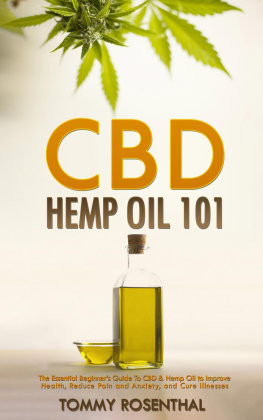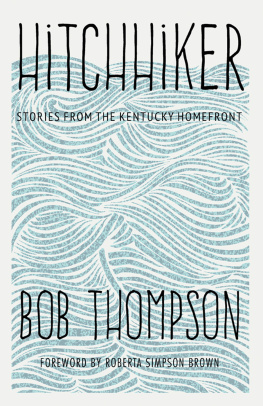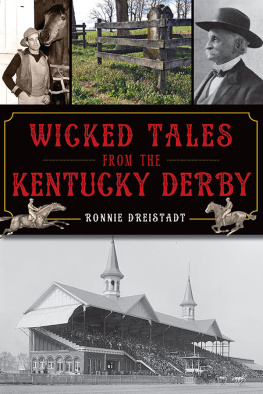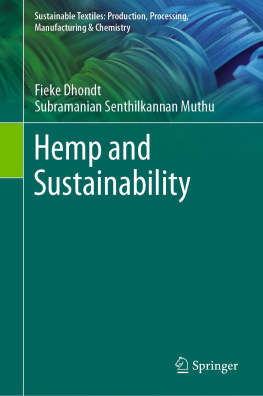Published by The History Press
Charleston, SC
www.historypress.com
Copyright 2021 by Dan Isenstein
All rights reserved
E-Book year 2021
Front cover, bottom: National Archives, ID 20191122. Series: War Hemp Industries, 19421946.
Unless otherwise indicated, all images are courtesy of the author.
First published 2021
ISBN 978.1.4396.7325.6
Library of Congress Control Number: 2021938371
Print Edition ISBN 978.1.4671.4883.2
Notice: The information in this book is true and complete to the best of our knowledge. It is offered without guarantee on the part of the author or The History Press. The author and The History Press disclaim all liability in connection with the use of this book.
All rights reserved. No part of this book may be reproduced or transmitted in any form whatsoever without prior written permission from the publisher except in the case of brief quotations embodied in critical articles and reviews.
This book is dedicated to my mom, who always encouraged my writing. And to my dad, who supported me through school, even if he never really understood what I was doing. A special shout-out to all of the teachers and professors who not only tolerated my coloring outside the lines but also encouraged it.
CONTENTS
FOREWORD
The history of America is the history of hemp; they are inextricably entwined. Since Jamestown in 1610, even before America was America, the government mandated its cultivation and allowed taxes to be paid in hemp stalk. The seed of choice for western expansion, still today, thousands of acres of hemp are near streams and rivers throughout the Midwest. The source of canvas for wagons and ropes for mines, rigging for ships and fodder for animalswithout hemp, could there even be an America as we know it today? The War of 1812 was fought over it, and Mormon founder Joseph Smith demanded that it be planted: grow hemp or go naked. Fancied as a component in Henry Fords cars, his company even grew it in Michigan. Despite the USDAs Hemp for Victory campaign, the crop was caught up in laws designed to continue the enslavement of people of color via prison sentences. Hemp was not truly free from 1937 until the Farm Bill eighty-one years later. And for most of American history, Kentucky was ground zero for the cultivation and development of hemp and its 25,000 products. Read here that proud and robust history.
Richard Rose,
The Richard Rose Report
PREFACE
I refer to my work as history lite. The purpose is to make a topic engaging to the casual reader while at the same time whetting the appetite of more inquisitive readers for their own dig into any individual narrative. Kentucky hemp history is so entwined with the overall state narrative that a work of this nature cannot possibly be undertaken without glaring omissions. This is especially so in the chapter about Lexington/Fayette County, the capital of Kentuckys hempire. Names like Thomas and Nathaniel Hart and Thomas and Peter January are conspicuous in their absence.
In other places, seemingly minor stories are used to indulge in deeper explorations of topics such as the binder twine boom of the 1890s or the Billion Dollar Crop era of the 1930s. Likewise, the relationship between hemp and slavery is explored in several places.
No one book could possibly explore all aspects of the hemp industrys impact on the development of the Commonwealth of Kentucky. This volume is an initial attempt to share over two hundred years of hempstory. There is so much more to discover.
ACKNOWLEDGEMENTS
Too many people assisted in this project or provided some sort of support to thank them all. Jenny Leslie and Trent Rogers provided valuable feedback to the manuscript and listened to me ramble; Mike Robinson, Marla Rivera, Bill Reinke and Stephen Ackerman. Eric James and Michael Denis helped researching Danville/Boyle County. Ted Spears was incredibly patient, and his donation of the family business records to the University of Kentucky provided access to information that in some cases has not been viewed in over one hundred years. They help make this book unique. I am truly grateful to have facilitated this donation. Richard Rose, who wrote the foreword and has been a source of support and guidance since I embarked on my journey into hemp. Harry Enoch helped compile the hempstory of early Clark County. Thanks also to: Sandy Stultz and the staff of the Bluegrass Heritage Museum in Winchester; Tandy Nash at the Gateway Museum in Maysville; Julia Taylor at the Scott County Public Library; the Woodford County Historical Society; Melody Williams of the Danville Public Library in Danville, Illinois; Julie Kemper at the Kentucky Historical Society; Foster Ockerman, Beth Crosby, Kent Brown, who befriended me early in my attempt to make Kentuckys hemp history a bigger story and with whom I am coproducing a documentary on U.S. hemp history; the Jessamine County Historical Society; Megan Mummy and the staff at the University of Kentuckys Special Collections Library; the staff at the Capital City Museum in Frankfort, who made the connection between Paul Sawyier and Kentucky River Mills; John Dvorak; Chad Rhoad and Rick Delaney, my editors at The History Press; and countless others who have supported and encouraged this project.
Hempfield at University of Kentucky Research Farm during the Pilot Program Field Day 2015.
INTRODUCTION
Why a book about Kentuckys hemp industry structured around roadside historical markers that mention hemp? Celebrated Kentucky historian Thomas D. Clark provides the answer: The production of hemp historically bore a close relationship to the economic, social and political history of the Commonwealth. In other words, Kentuckys hempstory is a narrative thread woven throughout all aspects of Kentucky life and state history.
There are currently fourteen historical markers (at least three are missing) in twelve Kentucky counties touching on the states hemp industry. Ten of these markers share a side with similar content. The following passage is a synthesis of that shared content:
Hemp in KentuckyFirst crop grown, 1775. From 1840 to 1860, KYs production largest in U.S. Peak in 1850 was 40,000 tons, with value of 5,000,000. Scores of factories made twine, rope, oakum to caulk sailing ships, gunny sacks, bags for cotton picking and marketing. States largest cash crop until 1915. Market lost to imported jute, freed of tariff. As a war measure, hemp grown again during World War II.
In seven brief sentences, these ten signs that share a common side communicate 170 years of Kentucky history. In doing so, the markers reference the frontier, antebellum Kentucky, the turn of the twentieth century and the Second World War.
Hemp in Kentucky, a common sign at the back of many roadside historical markers, which share over 175 years of Kentucky hempstory.












